Cadillac CTS 2012 Owner's Manual

2012 Cadillac CTS/CTS-V Owner Manual M
In Brief . . . . . . . . . . . . . . . . . . . . . . . . 1-1
Instrument Panel . . . . . . . . . . . . . . 1-2
Initial Drive Information . . . . . . . . 1-4
Vehicle Features . . . . . . . . . . . . . 1-17
Performance and
Maintenance . . . . . . . . . . . . . . . . 1-24
Keys, Doors, and
Windows . . . . . . . . . . . . . . . . . . . . 2-1
Keys and Locks . . . . . . . . . . . . . . . 2-2
Doors . . . . . . . . . . . . . . . . . . . . . . . . 2-20
Vehicle Security. . . . . . . . . . . . . . 2-26
Exterior Mirrors . . . . . . . . . . . . . . . 2-30
Interior Mirrors . . . . . . . . . . . . . . . . 2-31
Windows . . . . . . . . . . . . . . . . . . . . . 2-31
Roof . . . . . . . . . . . . . . . . . . . . . . . . . . 2-34
Seats and Restraints . . . . . . . . . 3-1
Head Restraints . . . . . . . . . . . . . . . 3-2
Front Seats . . . . . . . . . . . . . . . . . . . . 3-3
Rear Seats . . . . . . . . . . . . . . . . . . . 3-11
Safety Belts . . . . . . . . . . . . . . . . . . 3-12
Airbag System . . . . . . . . . . . . . . . . 3-21
Child Restraints . . . . . . . . . . . . . . 3-35
Storage . . . . . . . . . . . . . . . . . . . . . . . 4-1
Storage Compartments . . . . . . . . 4-1
Additional Storage Features . . . 4-2
Roof Rack System . . . . . . . . . . . . . 4-6
Instruments and Controls . . . . 5-1
Controls . . . . . . . . . . . . . . . . . . . . . . . 5-2
Warning Lights, Gauges, and
Indicators . . . . . . . . . . . . . . . . . . . 5-11
Information Displays . . . . . . . . . . 5-28
Vehicle Messages . . . . . . . . . . . . 5-33
Vehicle Personalization . . . . . . . 5-48
Universal Remote System . . . . 5-56
Lighting . . . . . . . . . . . . . . . . . . . . . . . 6-1
Exterior Lighting . . . . . . . . . . . . . . . 6-1
Interior Lighting . . . . . . . . . . . . . . . . 6-6
Lighting Features . . . . . . . . . . . . . . 6-7
Infotainment System . . . . . . . . . 7-1
Introduction . . . . . . . . . . . . . . . . . . . . 7-1
Radio . . . . . . . . . . . . . . . . . . . . . . . . . . 7-8
Audio Players . . . . . . . . . . . . . . . . 7-18
Phone . . . . . . . . . . . . . . . . . . . . . . . . 7-38
Trademarks and License
Agreements . . . . . . . . . . . . . . . . . 7-46
Climate Controls . . . . . . . . . . . . . 8-1
Climate Control Systems . . . . . . 8-1
Air Vents . . . . . . . . . . . . . . . . . . . . . . . 8-6
Maintenance . . . . . . . . . . . . . . . . . . . 8-6

2012 Cadillac CTS/CTS-V Owner Manual M
Driving and Operating . . . . . . . . 9-1
Driving Information . . . . . . . . . . . . . 9-2
Starting and Operating . . . . . . . 9-16
Engine Exhaust . . . . . . . . . . . . . . 9-27
Automatic Transmission . . . . . . 9-28
Manual Transmission . . . . . . . . . 9-32
Drive Systems . . . . . . . . . . . . . . . . 9-35
Brakes . . . . . . . . . . . . . . . . . . . . . . . 9-35
Ride Control Systems . . . . . . . . 9-40
Cruise Control . . . . . . . . . . . . . . . . 9-43
Object Detection Systems . . . . 9-46
Fuel . . . . . . . . . . . . . . . . . . . . . . . . . . 9-52
Towing . . . . . . . . . . . . . . . . . . . . . . . 9-57
Conversions and Add-Ons . . . 9-63
Vehicle Care . . . . . . . . . . . . . . . . . 10-1
General Information . . . . . . . . . . 10-3
Vehicle Checks . . . . . . . . . . . . . . . 10-4
Headlamp Aiming . . . . . . . . . . . 10-36
Bulb Replacement . . . . . . . . . . 10-38
Electrical System . . . . . . . . . . . . 10-41
Wheels and Tires . . . . . . . . . . . 10-66
Jump Starting . . . . . . . . . . . . . . 10-110
Towing . . . . . . . . . . . . . . . . . . . . . 10-115
Appearance Care . . . . . . . . . . 10-118
Service and Maintenance . . . 11-1
General Information . . . . . . . . . . 11-1
Cadillac Premium Care
Maintenance . . . . . . . . . . . . . . . . 11-3
Maintenance Schedule . . . . . . . 11-4
Special Application
Services . . . . . . . . . . . . . . . . . . . . 11-9
Additional Maintenance
and Care . . . . . . . . . . . . . . . . . . . 11-10
Recommended Fluids,
Lubricants, and Parts . . . . . . 11-13
Maintenance Records . . . . . . . 11-17
Technical Data . . . . . . . . . . . . . . . 12-1
Vehicle Identification . . . . . . . . . 12-1
Vehicle Data . . . . . . . . . . . . . . . . . . 12-2
Customer Information . . . . . . . 13-1
Customer Information . . . . . . . . 13-2
Reporting Safety Defects . . . . 13-19
Vehicle Data Recording and
Privacy. . . . . . . . . . . . . . . . . . . . 13-20
OnStar . . . . . . . . . . . . . . . . . . . . . . . 14-1
OnStar Overview. . . . . . . . . . . . . 14-1
OnStar Services . . . . . . . . . . . . . . 14-2
OnStar Additional
Information . . . . . . . . . . . . . . . . . . 14-5
Index . . . . . . . . . . . . . . . . . . . . . i-1
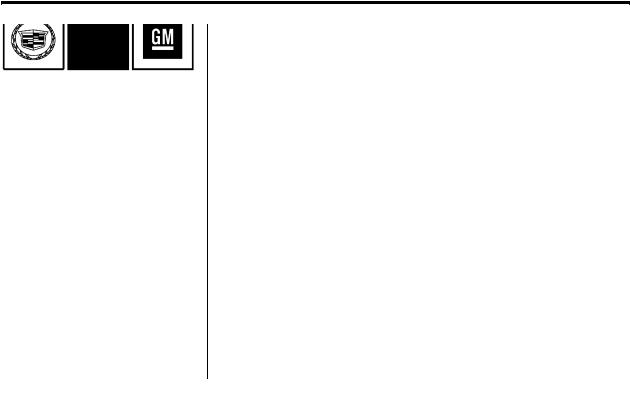
Introduction iii
The names, logos, emblems, slogans, vehicle model names, and vehicle body designs appearing in this manual including, but not limited to, GM, the GM logo, CADILLAC, the CADILLAC Crest and Wreath, CTS, and CTS-V are trademarks and/or service marks of General Motors LLC, its subsidiaries, affiliates, or licensors.
This manual describes features that may or may not be on your specific vehicle either because they are options that you did not purchase or due to changes subsequent to the printing of this owner manual. Please refer to the purchase documentation relating to your specific vehicle to confirm each of the features found on your vehicle. For vehicles first sold in Canada, substitute the name “General Motors of Canada Limited” for Cadillac Motor Car Division wherever it appears in this manual.
Keep this manual in the vehicle for quick reference.
Canadian Vehicle Owners
Propriétaires Canadiens
A French language copy of this manual can be obtained from your dealer or from:
On peut obtenir un exemplaire de ce guide en français auprès du concessionnaire ou à l'adresse suivante:
Helm, Incorporated
Attention: Customer Service
47911 Halyard Drive
Plymouth, MI 48170
Litho in U.S.A. |
© 2011 General Motors LLC. All Rights Reserved. |
Part No. 20882358 B Second Printing |
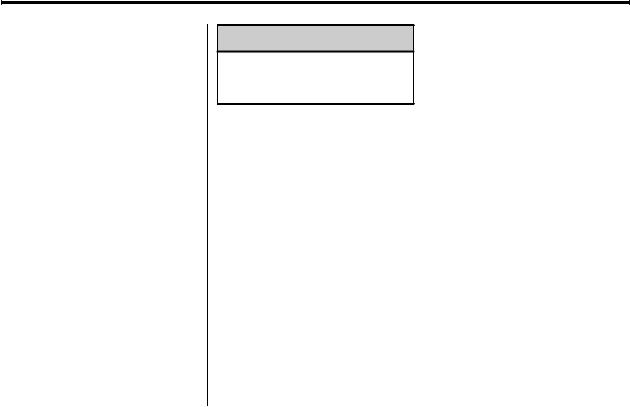
iv Introduction
Using this Manual
To quickly locate information about the vehicle, use the Index in
the back of the manual. It is an alphabetical list of what is in the manual and the page number where it can be found.
Danger, Warnings, and
Cautions
Warning messages found on vehicle labels and in this manual describe hazards and what to do to avoid or reduce them.
Danger indicates a hazard with a high level of risk which will result in serious injury or death.
Warning or Caution indicates a hazard that could result in injury or death.
{WARNING
These mean there is something that could hurt you or other people.
Notice: This means there is something that could result in property or vehicle damage. This would not be covered by the vehicle's warranty.
A circle with a slash through it is a safety symbol which means “Do Not,” “Do not do this,” or “Do not let this happen.”
Symbols
The vehicle has components and labels that use symbols instead of text. Symbols are shown along with the text describing the operation or information relating to a specific component, control, message, gauge, or indicator.
M : This symbol is shown when you need to see your owner manual for additional instructions or information.
* : This symbol is shown when you need to see a service manual for additional instructions or information.

Introduction v
Vehicle Symbol Chart
Here are some additional symbols that may be found on the vehicle and what they mean. For more information on the symbol, refer to the Index.
9 : Airbag Readiness Light
# : Air Conditioning
! : Antilock Brake System (ABS)
% : Audio Steering Wheel Controls or OnStar®
$ : Brake System Warning Light
" : Charging System
I : Cruise Control
B : Engine Coolant Temperature
O : Exterior Lamps
# : Fog Lamps
. : Fuel Gauge
+ : Fuses
3 : Headlamp High/Low-Beam
Changer
( : Heated Steering Wheel
j : LATCH System Child
Restraints
* : Malfunction Indicator Lamp
: : Oil Pressure
} : Power
/ : Remote Vehicle Start
> : Safety Belt Reminders
7 : Tire Pressure Monitor
d : Traction Control/StabiliTrak®
M : Windshield Washer Fluid

vi Introduction
2 NOTES

In Brief |
1-1 |
In Brief
Instrument Panel
Instrument Panel . . . . . . . . . . . . . . 1-2
Initial Drive Information
Initial Drive Information . . . . . . . . 1-4
Starting the Engine . . . . . . . . . . . 1-4
Remote Keyless Entry (RKE)
System . . . . . . . . . . . . . . . . . . . . . . 1-4
Remote Vehicle Start . . . . . . . . . 1-5
Door Locks . . . . . . . . . . . . . . . . . . . 1-6
Liftgate . . . . . . . . . . . . . . . . . . . . . . . . 1-7
Trunk Release . . . . . . . . . . . . . . . . 1-7
Windows . . . . . . . . . . . . . . . . . . . . . . 1-8
Seat Adjustment . . . . . . . . . . . . . . 1-8
Memory Features . . . . . . . . . . . . 1-10
Heated and Ventilated
Seats . . . . . . . . . . . . . . . . . . . . . . . 1-11
Head Restraint
Adjustment . . . . . . . . . . . . . . . . . 1-11
Safety Belts . . . . . . . . . . . . . . . . . . 1-11
Passenger Sensing
System . . . . . . . . . . . . . . . . . . . . . 1-12
Mirror Adjustment . . . . . . . . . . . . 1-12
Steering Wheel
Adjustment . . . . . . . . . . . . . . . . . 1-13
Interior Lighting . . . . . . . . . . . . . . 1-13
Exterior Lighting . . . . . . . . . . . . . 1-14
Windshield Wiper/Washer . . . . 1-14
Climate Controls . . . . . . . . . . . . . 1-16
Transmission . . . . . . . . . . . . . . . . 1-16
Vehicle Features
Radio(s) . . . . . . . . . . . . . . . . . . . . . 1-17
Satellite Radio . . . . . . . . . . . . . . . 1-18
Portable Audio Devices . . . . . . 1-18
Bluetooth® . . . . . . . . . . . . . . . . . . . 1-18
Mobile Apps . . . . . . . . . . . . . . . . . 1-18
Steering Wheel Controls . . . . . 1-19
Cruise Control . . . . . . . . . . . . . . . 1-20
Navigation System . . . . . . . . . . . 1-20
Driver Information
Center (DIC) . . . . . . . . . . . . . . . 1-20
Rear Vision
Camera (RVC) . . . . . . . . . . . . . 1-21
Ultrasonic Parking Assist . . . . 1-22
Storage Compartments . . . . . . 1-22
Power Outlets . . . . . . . . . . . . . . . 1-22
Universal Remote System . . . 1-23
Sunroof . . . . . . . . . . . . . . . . . . . . . . 1-23
Performance and Maintenance
Traction Control
System (TCS) . . . . . . . . . . . . . . 1-24 StabiliTrak® System . . . . . . . . . 1-24 Tire Pressure Monitor . . . . . . . . 1-24 Tire Sealant and
Compressor Kit . . . . . . . . . . . . . 1-25 Engine Oil Life System . . . . . . 1-25 Driving for Better Fuel
Economy . . . . . . . . . . . . . . . . . . . 1-25
Roadside Service . . . . . . . . . . . . 1-26 OnStar® . . . . . . . . . . . . . . . . . . . . . 1-26
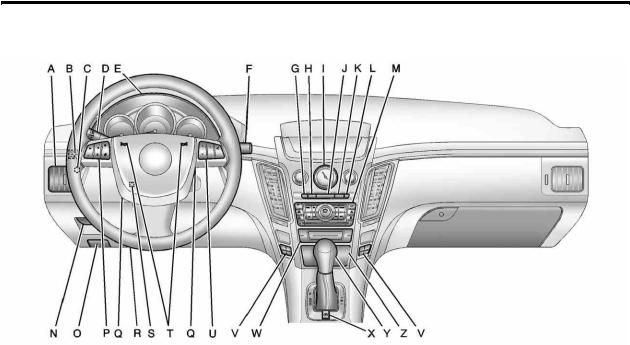
1-2 In Brief
Instrument Panel
CTS Shown, CTS V Similar

In Brief |
1-3 |
A.Air Vents on page 8 6.
B.Driver Information Center (DIC) on page 5 28.
C.Instrument Panel Illumination Control on page 6 6.
D.Turn and Lane-Change Signals on page 6 5.
E.Instrument Cluster on page 5 12.
F.Windshield Wiper/Washer on page 5 4.
Rear Window Wiper/Washer on page 5 6 (If Equipped).
G.Navigation Button (If Equipped). See Navigation System Manual.
H.Traction Control System (TCS) on page 9 40.
Magnetic Ride Control on
page 9 42 (CTS V Model Only).
I.Clock on page 5 9.
J.Passenger Sensing System on page 3 28.
K.Hazard Warning Flashers on page 6 5.
L.Navigation Display Brightness Control (If Equipped). See Navigation System Manual.
M.Infotainment on page 7 1.
Navigation/Radio System
(If Equipped). See Navigation System Manual.
N.Parking Brake Release Lever. See Parking Brake (Electric) on page 9 37 or Parking Brake (Manual) on page 9 36.
O.Hood Release. See Hood on page 10 5.
P.Cruise Control on page 9 43.
Heated Steering Wheel on page 5 4 (If Equipped).
Traction Control System (TCS) Disable Button (CTS-V Model Only). See Traction Control System (TCS) on page 9 40.
Q.Tap Shift Controls (If Equipped). Located on the rear of the steering wheel. See Manual Mode on page 9 30.
R.Data Link Connector (DLC) (Out of View). See Malfunction Indicator Lamp on page 5 20.
S.Steering Wheel Adjustment on page 5 2.
T.Horn on page 5 4.
U.Steering Wheel Controls on page 5 3.
V.Heated and Ventilated Front Seats on page 3 10.
W.Dual Automatic Climate Control System on page 8 1.
X.Parking Brake Button.
See Parking Brake (Electric) on page 9 37 or Parking Brake (Manual) on page 9 36.
Y.Shift Lever. See Automatic Transmission on page 9 28 or Manual Transmission on page 9 32.
Z.Instrument Panel Storage on page 4 1.
Power Outlets on page 5 10.
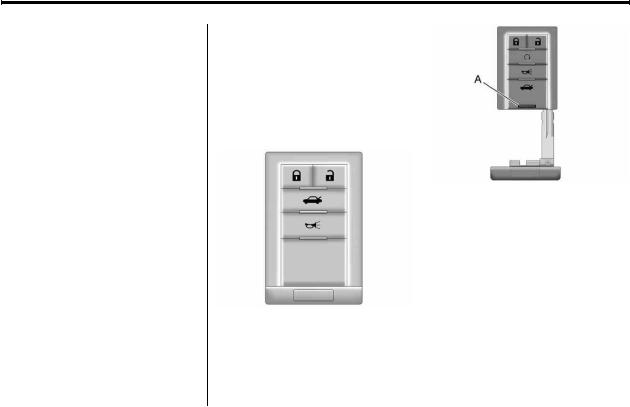
1-4 In Brief
Initial Drive
Information
This section provides a brief overview about some of the important features that may or may not be on your specific vehicle.
For more detailed information, refer to each of the features which can be found later in this owner manual.
Starting the Engine
When first starting the vehicle, the engine idle speed will be elevated to allow the catalytic converter, an emissions control device, to quickly reach operating temperature.
After approximately 20 seconds, the engine will begin to transition to its normal, quieter idle speed, which can vary depending on the temperature. This is normal operation.
Remote Keyless Entry
(RKE) System
On some models, the RKE transmitter is used to lock and unlock the doors from up to
20 m (65 ft) away from the vehicle. On other models, it can be used up to 60 m (195 ft) away.
Key Access
Keyless Access
Press K to unlock the driver door. Press again within five seconds to unlock all remaining doors.
Press Q to lock all doors.
Lock and unlock feedback can be personalized. See Vehicle Personalization on page 5 48.

In Brief |
1-5 |
Press and hold V / 8to open the trunk/liftgate.
Press L and release to locate the vehicle.
Press and hold L for more than two seconds to sound the panic alarm.
Press L again to cancel the panic alarm.
For keyless access vehicles, press the button (A) to remove the key. The key can be used for all locks.
See Keys on page 2 2 and Remote Keyless Entry (RKE) System Operation (Keyless Access) on page 2 7 or Remote Keyless
Entry (RKE) System Operation (Key Access) on page 2 5.
Remote Vehicle Start
For vehicles with this feature, the engine can be started from outside of the vehicle.
Starting the Vehicle
1.Aim the Remote Keyless Entry (RKE) transmitter at the vehicle.
2.Press and release Q.
3.Immediately after completing Step 2, press and hold / for at least four seconds or until the vehicle's turn signal lamps flash.
When the vehicle starts, the parking lamps will turn on and remain on as long as the engine is running. The doors will be locked and the climate control system may
come on.
The engine will continue to run for 10 minutes. Repeat the steps for a 10-minute time extension. Remote start can be extended only once.
Canceling a Remote Start
To cancel a remote start:
.Aim the RKE transmitter at the vehicle and press and hold / until the parking lamps turn off.
.Turn on the hazard warning flashers.
.Turn the vehicle on and then off.
See Remote Vehicle Start on page 2 13.
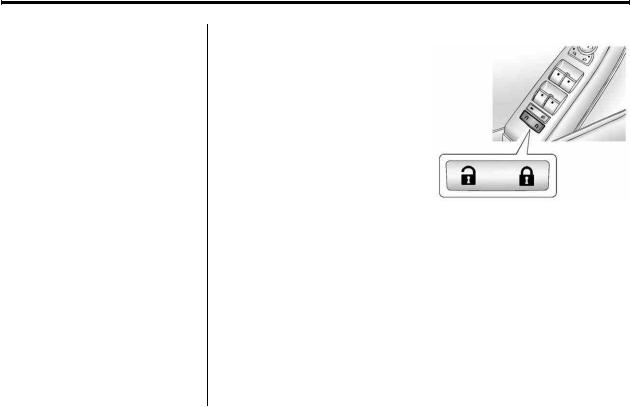
1-6 In Brief
Door Locks
To lock or unlock a door manually:
Sedan and Wagon Base Model
From the inside, use the door lock knob on the top of doors.
Sedan and Wagon Uplevel Model
From the inside, for a front door pull the door handle. Pulling the door handle again unlatches the door. For a rear door use the door lock knob on the top of the door.
Coupe Model
To open a door from the inside, press the door latch button, or pull the manual door release handle on the driver side floor. See Door Locks (Coupe) on page 2 16 or Door Locks (Sedan and Wagon) on
page 2 15.
Sedan and Wagon Model
From the outside, turn the key toward the front or rear of the
vehicle, or press Q or K on
the Remote Keyless Entry (RKE) transmitter. See Remote Keyless Entry (RKE) System Operation (Keyless Access) on page 2 7 or Remote Keyless Entry (RKE) System Operation (Key Access) on page 2 5.
Coupe Model
From the outside, use the key to unlock the trunk then pull the manual door release handle,
or press Q or K on the
RKE transmitter. See Door Locks (Coupe) on page 2 16 or Door Locks (Sedan and Wagon) on page 2 15 and Remote Keyless Entry (RKE) System Operation (Keyless Access) on page 2 7 or Remote Keyless Entry (RKE) System Operation (Key Access) on page 2 5.
Power Door Locks
Sedan/Wagon Shown,
Coupe Similar
Q : Press to lock the doors.
K : Press to unlock the doors.
See Power Door Locks on page 2 18.
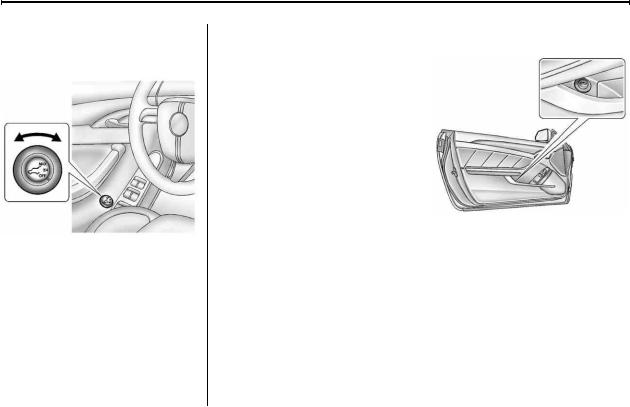
In Brief |
1-7 |
Liftgate
Power Liftgate
Vehicles with an automatic transmission must be in P (Park) and a manual transmission must be in Neutral to operate the power liftgate.
To open the liftgate from inside, select the mode then press the center of the button. See Liftgate on page 2 22 for more information on programming the height opening settings.
To open the liftgate with the Remote Keyless Entry (RKE) transmitter,
press and hold 8on the RKE transmitter.
To open the liftgate from outside the vehicle, press the touch pad on the outside liftgate handle.
Manual Operation of the Power
Liftgate
With the vehicle in P (Park), turn the liftgate mode switch to OFF and unlock the doors. Press the touch pad under the liftgate handle and pull up on the handle. To close the liftgate, pull down on the pull cup. See Liftgate on page 2 22.
Trunk Release
The remote trunk release button is on the driver door, inside the storage compartment under the armrest.
Vehicles with an automatic transmission, the shift lever must be in P (Park) or N (Neutral). Vehicles with a manual transmission, the shift lever must be in Neutral, and the parking brake set .
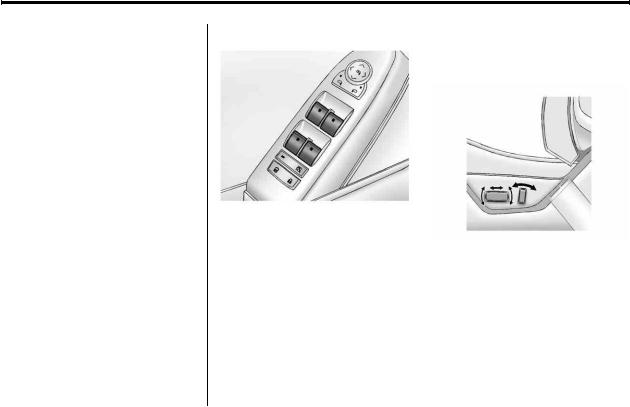
1-8 In Brief
The trunk may be opened by pressing the remote trunk release
button on the driver door, or V on the Remote Keyless Entry (RKE) transmitter, or the trunk release button located on the rear of the trunk above the license plate.
Vehicles with the Keyless Access System, if the vehicle is locked, the keyless access transmitter must be within 1 m (3 ft) of the trunk for it to be recognized, then the trunk can be opened by the trunk release button located above the license plate. See Trunk (Sedan, Coupe) on page 2 20 for more information.
Windows
Sedan Driver Side Shown,
Wagon and Coupe Similar
The driver power window switches controls all the windows.
The passenger switch only controls that window.
Press the switch down to lower the window. Pull the switch up to raise it.
For more information, see Power Windows on page 2 32.
Seat Adjustment
Power Seats
Seat Position
To adjust the seat:
.Move the seat forward or rearward by moving the horizontal control forward or rearward.
.Raise or lower the front or rear part of the seat cushion by moving the front or rear of the horizontal control up or down.
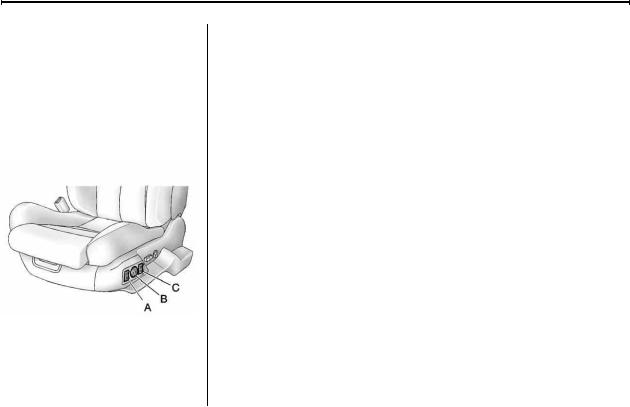
In Brief |
1-9 |
.Raise or lower the entire seat by moving the entire horizontal control up or down.
See Power Seat Adjustment on page 3 4.
Use the vertical control to adjust the seatback. See Reclining Seatbacks on page 3 6.
Power Lumbar
A.Side Bolster Control
B.Lumbar Support Control
C.Seatback Bolster Control
To adjust the lumbar support, if equipped:
.Press and hold the top of the control (B) to increase support to the top of the seatback and decrease support to the bottom of the seatback.
.Press and hold the bottom of the control (B) to decrease support to the top of the seatback and increase support to the bottom of the seatback.
.Press and hold the front or rear of the control (B) to increase or decrease support to the entire seatback.
See Lumbar Adjustment on page 3 5.
Side Bolster
To adjust the side bolster support, if equipped:
.Press the top or bottom of the control (A) to increase or decrease support in the seat cushion bolsters.
.Press the top or bottom of the control (C) to increase or decrease support in the seatback bolsters.
See Lumbar Adjustment on page 3 5.
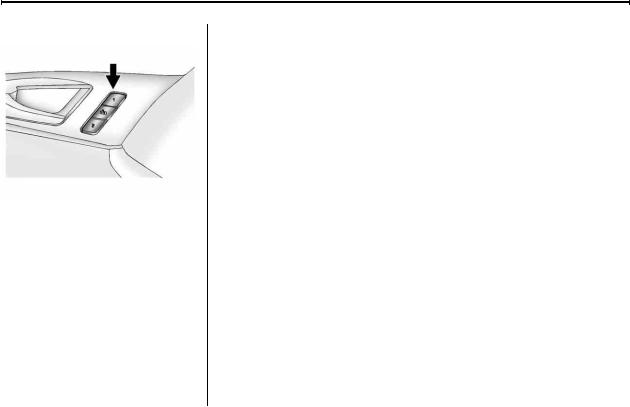
1-10 |
In Brief |
Memory Features
On vehicles with the memory package, memory buttons 1 and 2 on the driver door are used to save and recall memory settings for the driver seat cushion and seatback, outside mirrors, and the steering column position, if the vehicle is equipped with the power tilt and telescopic steering column.
1:Saves and recalls for driver 1.
2:Saves and recalls for driver 2.
B : Moves the driver seat and/or power steering column to the exit position. See “Exit Recall” later in this section.
Storing Memory Positions
To save into memory:
1.Adjust the driver seat, outside mirrors, and the power steering column, if equipped, to the desired driving positions.
2.Press and hold “1” until two beeps sound.
3.Repeat for a second driver using “2.”
To recall memory positions, press and release “1” or “2.” The vehicle must be in P (Park) for an automatic transmission, or the parking brake must be applied for a manual transmission. A single beep will sound when the button is pressed. The seat, outside mirrors, and/or power steering column will move to the position previously stored for the identified driver.
If entry/exit recall is programmed on in the vehicle personalization menu, automatic entry recall occurs when the ignition is turned on.
See Memory Seats on page 3 8 and Vehicle Personalization on page 5 48.
Exit Recall
B : Press to move the driver seat back a preset distance and/or the power steering column, if equipped, up and forward. A single beep sounds when the exit feature activates. The vehicle must be
in P (Park) for an automatic transmission, or the parking brake must be applied for a manual transmission.
If entry/exit recall is programmed on in the vehicle personalization menu, automatic seat and/or steering column movement occurs under certain conditions. See Memory Seats on page 3 8.
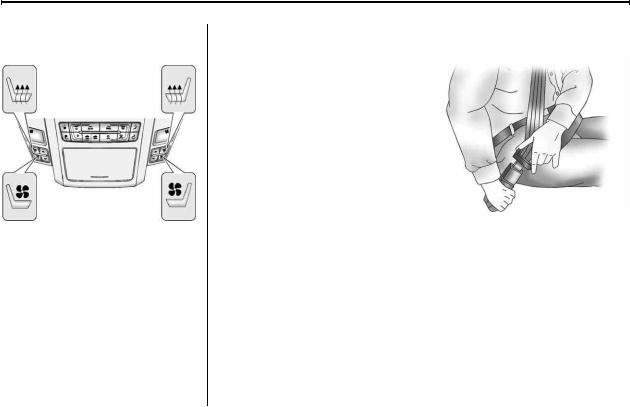
In Brief |
1-11 |
Heated and Ventilated
Seats
Heated and Ventilated Seat
Buttons Shown, Heated Seat
Buttons Similar
If available, the buttons are on the climate control panel. To operate, the ignition must be on.
M : Press to heat the seat.
{ : If available, press to ventilate the seat.
Press the button once for the highest setting. With each press of the button, the seat will change to the next lower setting, and then to the off setting. The lights on the climate control display indicate three for the highest setting and one for the lowest.
See Heated and Ventilated Front Seats on page 3 10.
Head Restraint
Adjustment
Do not drive until the head restraints for all occupants are installed and adjusted properly.
To achieve a comfortable seating position, change the seatback recline angle as little as necessary while keeping the seat and the head restraint height in the proper position.
See Head Restraints on page 3 2 and Seat Adjustment on page 3 3.
Safety Belts
Refer to the following sections for important information on how to use safety belts properly:
.Safety Belts on page 3 12.
.How to Wear Safety Belts Properly on page 3 14.
.Lap-Shoulder Belt on page 3 15.
.Lower Anchors and Tethers for Children (LATCH System) on page 3 43.
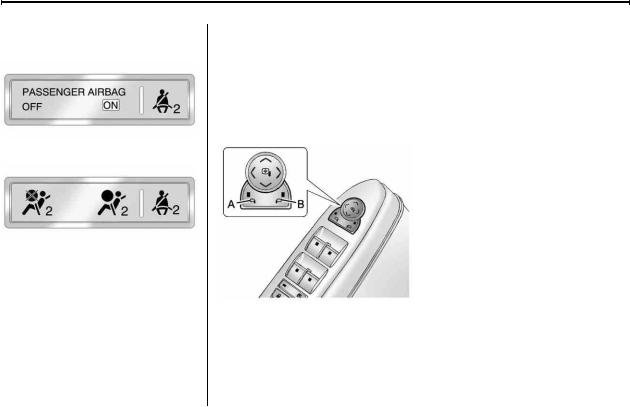
1-12 |
In Brief |
Passenger Sensing
System
United States
Canada and Mexico
The passenger sensing system will turn off the right front passenger frontal airbag under certain conditions. The driver airbag, seat mounted side impact airbags and the roof rail airbags are not affected by the passenger sensing system. See Passenger Airbag Status Indicator on page 5 19 for more information.
The passenger airbag status indicator will be visible on the instrument panel when the vehicle is started.
Mirror Adjustment
Exterior
Controls for the outside power mirrors are on the driver door.
To adjust each mirrors:
1.Press (A) or (B) to select the driver or passenger side mirror.
2.Press the arrows on the control pad to move the mirror up, down, right, or left.
3.Adjust each mirror so that a little of the vehicle and the area behind it can be seen.
4.Press (A) or (B) again to deselect the mirror.
See Power Mirrors on page 2 30.
Interior
The vehicle has an automatic dimming inside rearview mirror. Automatic dimming reduces the glare of headlamps from behind you.
See Automatic Dimming Rearview Mirror on page 2 31.
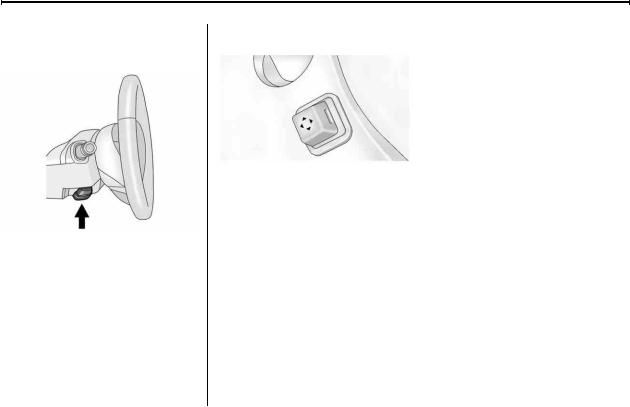
In Brief |
1-13 |
Steering Wheel
Adjustment
To adjust the steering wheel:
1.Pull the lever down.
2.Move the steering wheel up or down.
3.Pull or push the steering wheel closer or away from you.
4.Pull the lever up to lock the steering wheel in place.
Power Tilt Wheel
For vehicles with the power tilt wheel, the control is on the left side of the steering column.
.Push the control up or down to tilt the steering wheel up
or down.
.Push the control forward or rearward to move the steering wheel toward the front or rear of the vehicle.
Do not adjust the steering wheel while driving.
Interior Lighting
Reading Lamps
The reading lamps are located on the overhead console. These lamps come on automatically when any door is opened.
For manual operation, press the button next to each lamp to turn it on or off.
If the reading lamps are left on, they automatically shut off 10 minutes after the ignition has been
turned off.
For more information, see:
.Reading Lamps on page 6 7.
.Instrument Panel Illumination Control on page 6 6.
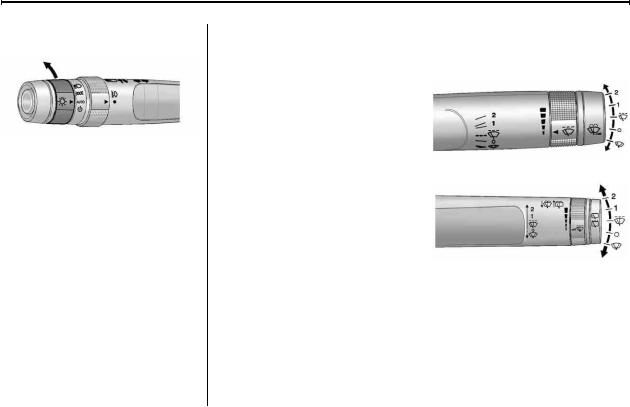
1-14 |
In Brief |
Exterior Lighting
The exterior lamp control is located toward the end of the turn signal/lane change lever.
O : Turn the band with this symbol on it to operate the exterior lamps.
The exterior lamp control has four positions:
O : Turns off all lamps, except the Daytime Running Lamps (DRL).
AUTO: Turns the headlamps on and off automatically, depending upon how much light is available outside of the vehicle.
; : Turns on the parking lamps, together with the sidemarker lamps, taillamps, license plate lamps, and instrument panel lights.
5 : Turns on the headlamps, together with the parking lamps, sidemarker lamps, taillamps, license plate lamps, and instrument panel lights.
For more information, see:
.Exterior Lamp Controls on page 6 1.
.Daytime Running Lamps (DRL) on page 6 3.
.Fog Lamps on page 6 6.
Windshield Wiper/Washer
The windshield wiper lever is on the right side of the steering column.
Sedan and Coupe Model shown
Wagon Model shown
Move the windshield wiper lever to select the wiper speed.
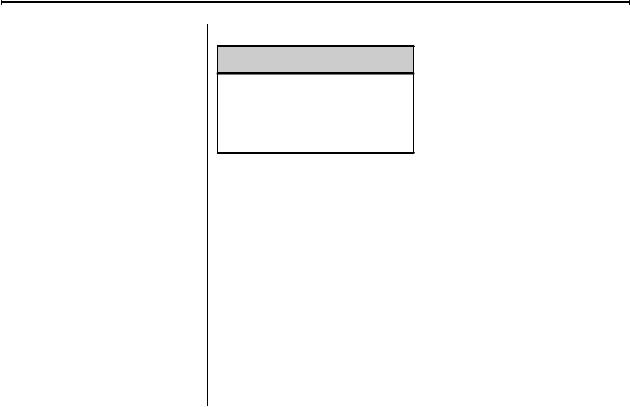
In Brief |
1-15 |
8 : Use for a single wipe. Briefly move the lever down and release. For several wipes, hold the
lever down.
( : Use to turn the wipers off.
3: For a delayed wiping cycle. Turn the band up for more frequent wipes or down for less frequent wipes.
1:Use for slow wipes.
2:Use for fast wipes.
Windshield Washer
{WARNING
In freezing weather, do not use the washer until the windshield is warmed. Otherwise the washer fluid can form ice on the windshield, blocking your vision.
Sedan and Coupe Model
K : Press the button with this symbol, on the end of the windshield washer lever, to wash the windshield. The washer fluid sprays onto the windshield and the wipers run for a few cycles to clear
the windshield. Press and hold K for more wash cycles.
Wagon Model
Pull the lever toward you to spray washer fluid on the windshield. The spray continues until the lever is released. The wipers will run a few times.
See Windshield Wiper/Washer on page 5 4 and Rear Window Wiper/Washer on page 5 6
(if equipped).
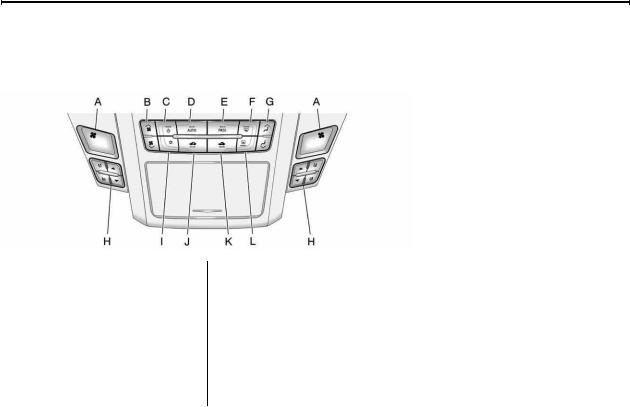
1-16 |
In Brief |
Climate Controls
The heating, cooling, and ventilation for the vehicle can be controlled with this system.
A.Display
B.Fan
C.Power
D.AUTO (Automatic Operation)
E.PASS (Passenger Climate Control)
F.Defrost
G.Air Delivery Mode
H.Temperature and Heated/Ventilated Seat
I.Air Conditioning
J.Recirculation
K.Outside Air
L.Rear Window Defogger
See Dual Automatic Climate Control System on page 8 1.
Transmission
Automatic Transmission
Driver Shift Control (DSC) or Tap Shift
Driver Shift Control (DSC) allows shifting an automatic transmission similar to a manual transmission. DSC can be enabled through the shift lever or the Tap Shift controls, located on the back of the steering wheel (if equipped). See Manual Mode on page 9 30.
Manual Transmission
Skip Shift (CTS V)
Under light acceleration, the transmission will only allow shifting from 1 (First) to 4 (Fourth). This helps improve fuel mileage. Under harder acceleration, Skip Shift is disabled, and all gears are
available. See Manual Transmission on page 9 32.

In Brief |
1-17 |
Vehicle Features
Radio(s)
VOL/ O : Press to turn the system on and off. Turn to increase or decrease the volume.
FM/AM: Press to select between FM or AM.
m : Press to select XM™, if equipped.
TUNE/TONE: Turn to select radio stations.
¨ SEEK or © SEEK: Press to seek the next or previous station.
INFO: Press to display additional information that may be available for the current song. When information is not available, No Information displays.
For more information about these and other radio features, see
Operation on page 7 3.
Storing a Favorite Station
A maximum of 36 stations can be programmed as favorites using the six softkeys below the radio station frequency tabs on the display and by using the radio favorites page button (FAV button). Press the FAV button to go through up to
six pages of favorites, each having six favorite stations available per page. Each page of favorites can contain any combination of AM, FM, or XM stations.
For more information, see AM-FM Radio on page 7 8.
Setting the Clock
The analog clock is located on the instrument panel above the radio. The clock is not connected with any other vehicle system and runs by itself. To adjust the clock:
1.Locate the adjustment buttons directly below the clock face.
2.Push and hold the right adjustment button to move the clock hands forward, or the left adjustment button to make the clock hands go backward. Holding either button down will cause the clock to advance faster. Release the button before the desired time is reached.
3.Push and release either button to adjust the time by one minute increments until the desired time is reached.
For more information on setting the clock, see Clock on page 5 9.

1-18 |
In Brief |
Satellite Radio
Vehicles with an XM™ satellite radio tuner and a valid XM satellite radio subscription can receive XM programming.
XM Satellite Radio Service
XM is a satellite radio service based in the 48 contiguous United States and 10 Canadian provinces. XM satellite radio has a wide variety of programming and commercial-free music, coast to coast, and in digital-quality sound. A fee is required to receive the XM service.
Refer to:
.www.xmradio.com or call 1-800-929-2100 (U.S.).
.www.xmradio.ca or call 1-877-438-9677 (Canada).
See Satellite Radio on page 7 11.
Portable Audio Devices
Some vehicles have a 3.5 mm (1/8 in) auxiliary input and a USB port located in the center console. External devices such as iPods® laptop computers, MP3 players, CD changers, and USB drives may be connected, depending on the audio system.
See Auxiliary Devices on page 7 36.
Bluetooth®
The Bluetooth system allows users with a Bluetooth-enabled cell phone to make and receive hands-free calls using the vehicle audio system and controls.
The Bluetooth-enabled cell phone must be paired with the in-vehicle Bluetooth system before it can be used in the vehicle. Not all phones will support all functions.
See Bluetooth on page 7 38.
Mobile Apps
Mobile apps are available for download through iTunes® to then access the iPhone® App Store and Google™ Marketplace for Android™. Search for the apps to download. The apps are free of charge; however, the myCadillac app requires the user to link their own vehicle and OnStar MyLink requires an active OnStar subscription.
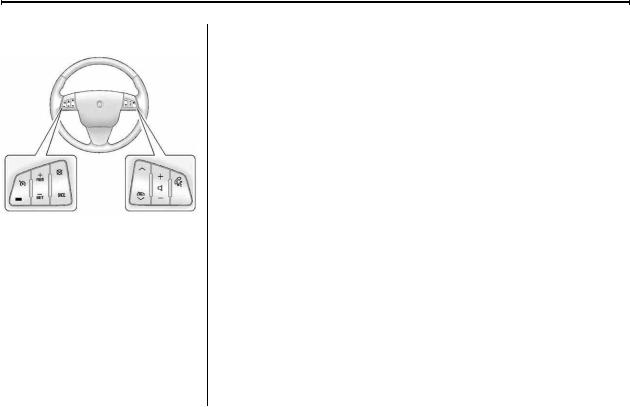
In Brief |
1-19 |
Steering Wheel Controls
Some audio steering wheel controls could differ depending on the vehicle's options.
Controls that can be adjusted at the steering wheel may include:
SRCE: Press to switch between AM, FM, or XM (if equipped) radio, CD, HDD (if equipped), auxiliary input jack, DVD (if equipped), and USB (if equipped).
y or c / z : Press to go to the previous or next radio station stored as a favorite, or the previous or next track of a CD.
Press to interact with the Bluetooth® system. See Bluetooth on
page 7 38 for more information.
+ e −: Press to increase or to decrease the volume.
b / g : Press and release to silence the vehicle speakers only. The audio of the wireless and wired headphones, if the vehicle has
these features, does not mute. Press and release b / g again, to turn the sound on.
.For vehicles with a navigation system, press and hold b / g for two seconds to initiate speech recognition.
.For vehicles without a navigation system, press and hold b / g for
two seconds to interact with OnStar® or Bluetooth.
.For vehicles with a navigation system, OnStar, or Bluetooth, press and hold b / g for
two seconds and say “hands free” to interact with OnStar or Bluetooth.
For more information, see Steering Wheel Controls on page 5 3.
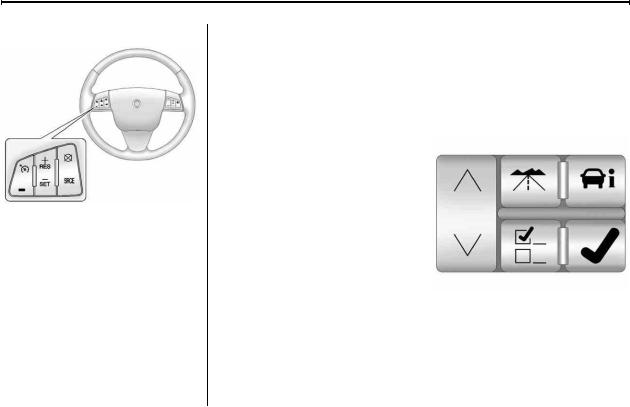
1-20 |
In Brief |
Cruise Control
CTS Shown, CTS V Similar
The cruise control buttons are located on the left side of the steering wheel.
I : Press to turn the system on or off. The indicator light on the button turns on when cruise control is on.
+RES: Press to make the vehicle accelerate or resume to a previously set speed.
−SET: Press to set the speed or make the vehicle decelerate.
[ : Press to cancel cruise control without erasing the set speed from memory.
See Cruise Control on page 9 43.
Navigation System
If the vehicle has a navigation system, there is a separate navigation system manual that includes information on the radio, audio players, and navigation system.
The navigation system provides detailed maps of most major freeways and roads. After a destination has been set, the system provides turn-by-turn instructions for reaching the destination. In addition, the system can help locate a variety of points of interest (POIs), such as banks, airports, restaurants, and more.
See the navigation system manual for more information.
Driver Information
Center (DIC)
The DIC display is located at the bottom of the instrument panel cluster. It shows the status of many vehicle systems and enables access to the personalization menu.
The DIC buttons are located on the instrument panel to the left of the steering wheel.

In Brief |
1-21 |
3 : Press to scroll through the trip and fuel displays.
T: Press to scroll through the vehicle information displays.
U : Press to customize the feature settings on your vehicle. See Vehicle Personalization on page 5 48 for more information.
V : Press to reset certain DIC features and to acknowledge DIC warning messages and clear them from the DIC display.
y or z : Press to scroll up and down the menu items.
For more information, see Driver Information Center (DIC) on page 5 28.
Vehicle Customization
Some vehicle features can be programmed by using the DIC buttons on the instrument panel to the left of the steering wheel. These features include:
.Language
.Door Lock and Unlock Settings
.Lighting
.Chime Volume
.Memory Settings
See Vehicle Personalization on page 5 48.
Rear Vision
Camera (RVC)
The rear vision camera displays a view of the area behind the vehicle on either the navigation screen or the inside rearview mirror when the vehicle is shifted into R (Reverse). Once shifted out of R (Reverse), the navigation screen will go back to the last screen that had been displayed, after a delay or the video image automatically disappears from the inside rearview mirror.
To clean the camera lens, located above the license plate, rinse it with water and wipe it with a soft cloth.
See Rear Vision Camera (RVC) on page 9 50 for more information.
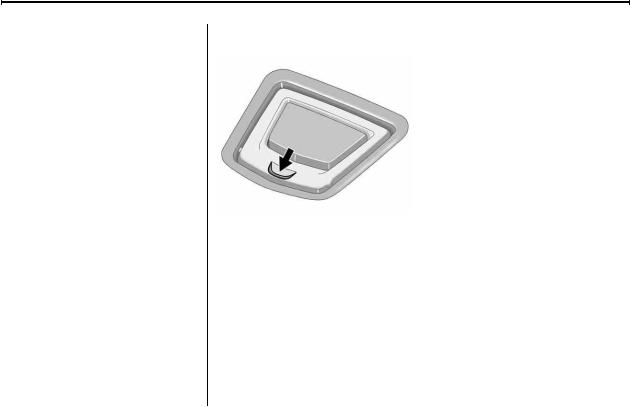
1-22 |
In Brief |
Ultrasonic Parking Assist
If available, Ultrasonic Rear Parking Assist (URPA) system uses sensors on the rear bumper to assist with parking and avoiding objects while in R (Reverse). It operates at speeds less than 8 km/h (5 mph). URPA uses audible beeps to provide distance and system information.
Keep the sensors on the vehicle's rear bumper clean to ensure proper operation.
See Ultrasonic Parking Assist on page 9 46.
Storage Compartments
Press the bottom of the load floor handle assembly to lift the top on the handle. Pull up on the handle to open the cargo management system.
See Cargo Management System (Wagon Only) on page 4 3 for more information.
Power Outlets
Accessory power outlets can be used to plug in electrical equipment, such as a cell phone or MP3 player.
There are three accessory power outlets. The power outlets located below the climate control system, inside the center console storage bin, and on the rear of the center console are powered while the vehicle is in ON/RUN, START or ACC/ACCESSORY mode, or until the driver door is opened within
10 minutes of turning off the vehicle.
On the CTS Wagon there is an additional accessory power outlet located near the rear cargo net that is powered at all times.
Remove the cover to access and replace when not in use.
See Power Outlets on page 5 10.
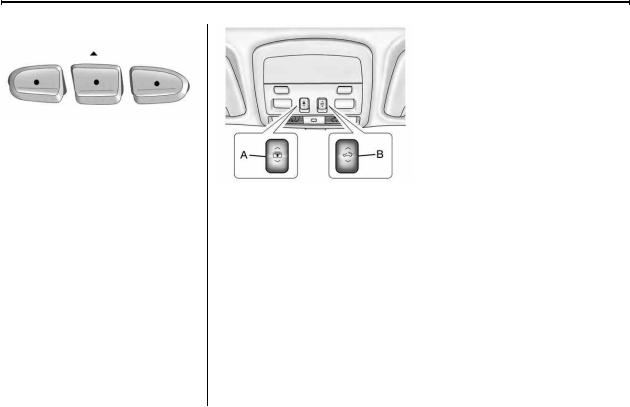
In Brief |
1-23 |
Universal Remote System
The Universal Home Remote System allows for garage door openers, security systems, and home automation devices to be programmed to work with these buttons in the vehicle.
See Universal Remote System on page 5 56.
Sunroof
If the vehicle has a power sunroof it will only operate when the ignition is in ON/RUN or ACC/ACCESSORY, or when Retained Accessory Power (RAP) is active. See Ignition Positions (Key Access) on
page 9 17 or Ignition Positions (Keyless Access) on page 9 19 and Retained Accessory Power (RAP) on page 9 23.
The driver side switch (A) operates the sunshade.
Open/Close: Press and hold the front or rear of the switch (A) to open or close the sunshade.
Express Open/Express Close:
Press and release the rear or front of the switch (A) to express open or express close the sunshade. To stop the sunshade partway, press the switch (A) a second time.
The passenger side switch (B) operates the sunroof.
Vent: Coupe only, press and hold the front of the switch (B) to vent the sunroof. The sunshade will automatically open approximately fifteen inches. Press and hold the rear of the switch (B) to close the sunroof vent.
Express Open/Express Close:
Press and release the rear or front of the switch (B) to express open or express close the sunroof. To stop the sunroof partway, press the switch (B) a second time.
Comfort Stop: The sunroof has a comfort stop feature that stops the sunroof from opening to the full-open position. Press the rear of the sunroof switch (B) to the first detent to open the sunroof to the comfort open position. Press the rear of the switch (B) again to fully open the sunroof.
For more information see Sunroof on page 2 34.

1-24 |
In Brief |
Performance and
Maintenance
Traction Control
System (TCS)
The traction control system limits wheel spin. The system turns on automatically every time the vehicle is started.
.To turn off traction control, press and release the TCS/StabiliTrak button Ylocated on the instrument panel (CTS) or
the steering wheel (CTS-V). The appropriate DIC message is displayed. See Ride Control
System Messages on page 5 42.
.Press the TCS/StabiliTrak button Yagain to turn traction control back on.
For more information, see Traction Control System (TCS) on
page 9 40.
StabiliTrak® System
StabiliTrak assists with directional control of the vehicle in difficult driving conditions. The system turns on automatically every time the vehicle is started.
.To turn off both traction control and electronic stability control, press and hold the TCS/StabiliTrak button Y
located on the instrument panel (CTS) or steering wheel (CTS-V) until g illuminates and the appropriate DIC messages are displayed. See Ride Control System Messages on page 5 42.
.Press the TCS/StabiliTrak button Yagain to turn on both systems.
For more information, see
StabiliTrak® System on page 9 41.
Tire Pressure Monitor
This vehicle may have a Tire Pressure Monitor System (TPMS).
The TPMS warning light alerts you to a significant loss in pressure of one of the vehicle's tires. If the warning light comes on, stop as soon as possible and inflate the tires to the recommended pressure shown on the Tire and Loading Information label. See Vehicle Load Limits on page 9 12. The warning light will remain on until the tire pressure is corrected.
During cooler conditions, the low tire pressure warning light may appear when the vehicle is first started and then turn off. This may be an early
